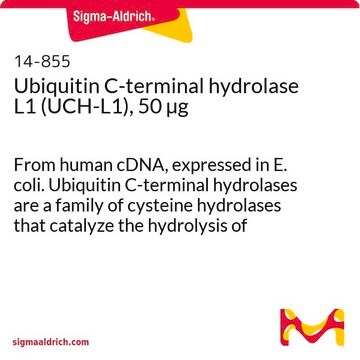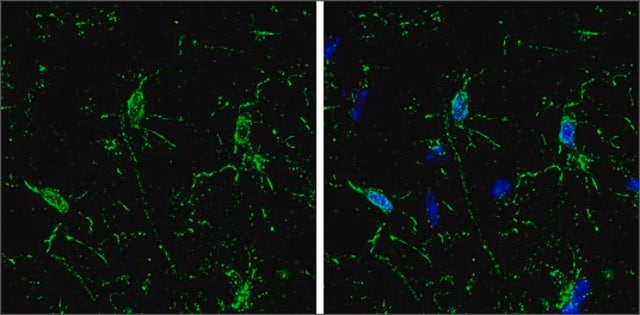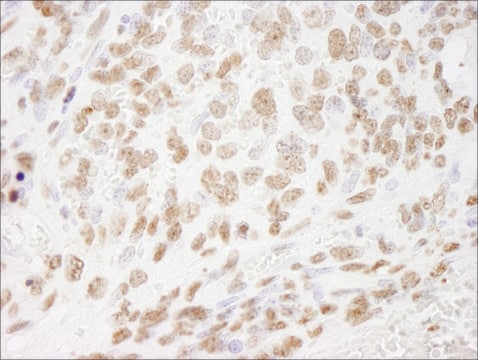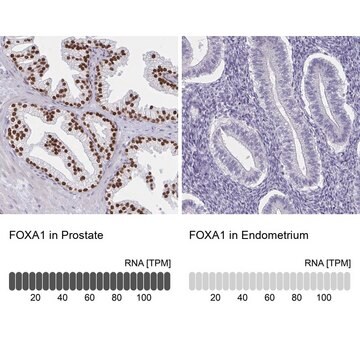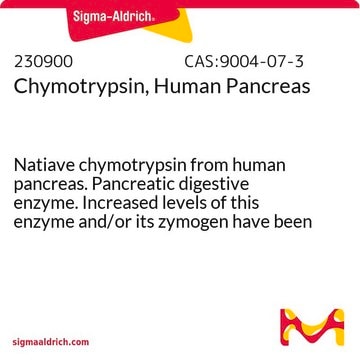14-856
Ubiquitin C-terminal hydrolase L3 (UCH-L3), 50 µg
From human cDNA, expressed in E. coli. Ubiquitin C-terminal hydrolases are a family of cysteine hydrolases that catalyze the hydrolysis of amides, esters & thioesters of the C-terminus of ubiquitin.
Se connecterpour consulter vos tarifs contractuels et ceux de votre entreprise/organisme
About This Item
Code UNSPSC :
12352200
eCl@ss :
32160405
Nomenclature NACRES :
NA.32
Produits recommandés
Source biologique
human
Niveau de qualité
Produit recombinant
expressed in E. coli
Activité spécifique
>1000 pmol/min-μg, 25 °C (with 1 μM ubiquitin-AMC as substrate and UCH-L3 at 20 pM (0.58 ng/mL).)
Poids mol.
Mw 26.2 kDa
Fabricant/nom de marque
Upstate®
Numéro d'accès NCBI
Numéro d'accès UniProt
Conditions d'expédition
dry ice
Description générale
Produced from human cDNA, expressed in E. coli. Ubiquitin C-terminal hydrolases (UCHs) are a family of cysteine hydrolases that catalyze the hydrolysis of amides, esters and thioesters of the C-terminus of ubiquitin. UCH-L3 is a member of the lower molecular weight group of UCHs involved in the hydrolysis of small C-terminal derivatives of ubiquitin that form non-specifically during the process of protein ubiquitinylation.
Product Source: Recombinant human UCH-L3 expressed in E.coli.
Application
From human cDNA, expressed in E. coli. Ubiquitin C-terminal hydrolases are a family of cysteine hydrolases that catalyze the hydrolysis of amides, esters & thioesters of the C-terminus of ubiquitin.
Stockage et stabilité
Store at -70°C for up to 12 months from date of receipt. As supplied, the enzyme is stable on ice for several hours. Activity is stable up to 6 freeze/thaw cycles (snap freezing in a dry/ice ethanol bath or liquid nitrogen).
Informations légales
UPSTATE is a registered trademark of Merck KGaA, Darmstadt, Germany
Clause de non-responsabilité
Unless otherwise stated in our catalog or other company documentation accompanying the product(s), our products are intended for research use only and are not to be used for any other purpose, which includes but is not limited to, unauthorized commercial uses, in vitro diagnostic uses, ex vivo or in vivo therapeutic uses or any type of consumption or application to humans or animals.
Code de la classe de stockage
12 - Non Combustible Liquids
Classe de danger pour l'eau (WGK)
WGK 1
Point d'éclair (°F)
Not applicable
Point d'éclair (°C)
Not applicable
Certificats d'analyse (COA)
Recherchez un Certificats d'analyse (COA) en saisissant le numéro de lot du produit. Les numéros de lot figurent sur l'étiquette du produit après les mots "Lot" ou "Batch".
Déjà en possession de ce produit ?
Retrouvez la documentation relative aux produits que vous avez récemment achetés dans la Bibliothèque de documents.
K D Wilkinson et al.
Journal of molecular biology, 291(5), 1067-1077 (1999-10-16)
The ubiquitin fold is a versatile and widely used targeting signal that is added post-translationally to a variety of proteins. Covalent attachment of one or more ubiquitin domains results in localization of the target protein to the proteasome, the nucleus
L J Kurihara et al.
Molecular and cellular biology, 20(7), 2498-2504 (2000-03-14)
Mice homozygous for the s(1Acrg) deletion at the Ednrb locus arrest at embryonic day 8.5. To determine the molecular basis of this defect, we initiated positional cloning of the s(1Acrg) minimal region. The mouse Uch-L3 (ubiquitin C-terminal hydrolase L3) gene
Roles of ubiquitinylation in proteolysis and cellular regulation
Wilkinson, K D
Annual Review of Nutrition, 15, 161-189 (1995)
Shahram Misaghi et al.
The Journal of biological chemistry, 280(2), 1512-1520 (2004-11-09)
Ubiquitin C-terminal hydrolases (UCHs) comprise a family of small ubiquitin-specific proteases of uncertain function. Although no cellular substrates have been identified for UCHs, their highly tissue-specific expression patterns and the association of UCH-L1 mutations with human disease strongly suggest a
Kinetic and mechanistic studies on the hydrolysis of ubiquitin C-terminal 7-amido-4-methylcoumarin by deubiquitinating enzymes.
Dang, L C, et al.
Biochemistry, 37, 1868-1879 (1998)
Notre équipe de scientifiques dispose d'une expérience dans tous les secteurs de la recherche, notamment en sciences de la vie, science des matériaux, synthèse chimique, chromatographie, analyse et dans de nombreux autres domaines..
Contacter notre Service technique